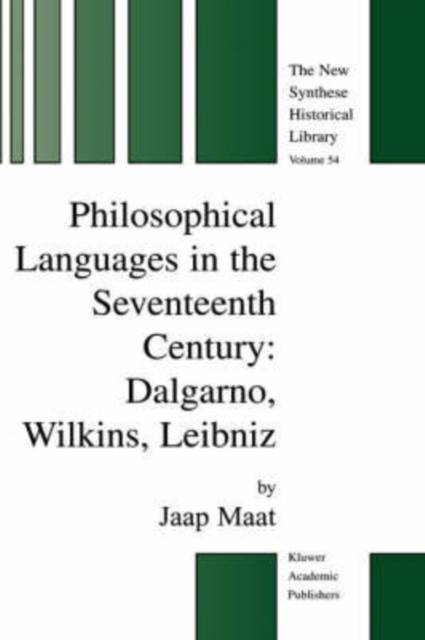
Door een staking bij bpost kan je online bestelling op dit moment iets langer onderweg zijn dan voorzien. Dringend iets nodig? Onze winkels ontvangen jou met open armen!
- Afhalen na 1 uur in een winkel met voorraad
- Gratis thuislevering in België vanaf € 30
- Ruim aanbod met 7 miljoen producten
Door een staking bij bpost kan je online bestelling op dit moment iets langer onderweg zijn dan voorzien. Dringend iets nodig? Onze winkels ontvangen jou met open armen!
- Afhalen na 1 uur in een winkel met voorraad
- Gratis thuislevering in België vanaf € 30
- Ruim aanbod met 7 miljoen producten
Zoeken
€ 209,95
+ 419 punten
Omschrijving
This book discusses three linguistic projects carried out in the seventeenth century: the artificial languages created by Dalgamo and Wilkins, and Leibniz's uncompleted scheme. It treats each of the projects as self- contained undertakings, which deserve to be studied and judged in their own right. For this reason, the two artificial languages, as well as Leib- niz's work in this area, are described in considerable detail. At the same time, the characteristics of these schemes are linked with their intellectual context, and their multiple interrelations are examined at some length. In this way, the book seeks to combine a systematical with a historical ap- proach to the subject, in the hope that both approaches profit from the combination. When I first started the research on which this book is based, I intended to look only briefly into the seventeenth-century schemes, which I assumed represented a typical universalist approach to the study of lan- guage, as opposed to a relativistic one. The authors of these schemes thought, or so the assumption was, that almost the only thing required for a truly universal language was the systematic labelling of the items of an apparently readily available, universal catalogue of everything that exists.
Specificaties
Betrokkenen
- Auteur(s):
- Uitgeverij:
Inhoud
- Aantal bladzijden:
- 419
- Taal:
- Engels
- Reeks:
- Reeksnummer:
- nr. 54
Eigenschappen
- Productcode (EAN):
- 9781402017582
- Verschijningsdatum:
- 29/02/2004
- Uitvoering:
- Hardcover
- Formaat:
- Genaaid
- Afmetingen:
- 169 mm x 248 mm
- Gewicht:
- 816 g

Alleen bij Standaard Boekhandel
+ 419 punten op je klantenkaart van Standaard Boekhandel
Beoordelingen
We publiceren alleen reviews die voldoen aan de voorwaarden voor reviews. Bekijk onze voorwaarden voor reviews.











